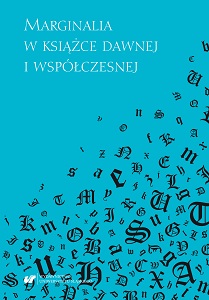Rola marginaliów w Postępku prawa czartowskiego…
The Role of Marginalia in Postępek prawa czartowskiego…
Author(s): Anna Kochan
Subject(s): Language and Literature Studies
Published by: Wydawnictwo Uniwersytetu Śląskiego
Summary/Abstract: Postępek prawa czartowskiego… (1570), which consists of two parts, constitutes a compilation of different genres and forms, written partly in narration and partly in dialogue. The first part tells the story of the devil’s legal trials and tribulations, while the second part is a condensed demonological text. This structure has affected the selection, kind and function of the marginalia: in the narrative and dialogical structure it is possible to identify notes similar to contemporary stage directions (names of characters, descriptions of actions, setting), issues and concepts important to the author (morally or doctrinally significant issues) as well as legal terms. The lack of explanation for the latter as well as their incidental character suggest that the author is a moralist rather than a theologian, as his legal knowledge seems to be lacking. The writings on the margins in the second part consist predominantly of short notes and quotes, in which the author points to the specialist nomenclature and contentious issues in demonology, even though he is incapable of explaining them himself: this could indicate that the author was a clergyman. Postępek prawa czartowskiego… is a genre hybrid, though at the same time it illustrates the relationship between the form and the choice of marginalia of a particular kind (in this perspective, localizations and Bible quotations are irrelevant). In the dialogical parts the author focuses on introducing the characters (thus, the marginalia function as stage directions), while in the narrative part, the focus shifts to key concepts and issues.
Book: Marginalia w książce dawnej i współczesnej
- Page Range: 101-117
- Page Count: 17
- Publication Year: 2019
- Language: Polish
- Content File-PDF

